Selling a house with code violations in Orlando
Q) If my house in Orlando has code violations can I sell the house without fixing them?
A) Yes, you can sell the house as-is if there is no danger to anyone’s health or if there is no nuisance affecting the neighbors.
There are many problems that are code violations that will not prevent you from selling your house. Some examples are leaky plumbing, shotty worksmanship and minor structural changes that aren’t inline with current standards. Before selling your house, problems like these must be documented on a form created by the Florida Association of Realtors and submitted to each potential buyer.
Q) Can a buyer sue me if I sell a house with code violations that I didn’t know about?
A) No, he cannot.
According to an appeals case presented at the second district court of Florida, a seller cannot be sued on code violations that he “should have known” (JENSEN v. BAILEY | 76 So.3d 980 (2011)). This decision was extremely important because it protects home sellers from situations beyond their control. It also accentuates the need for any buyer to look at a bona fide home inspection report before buying a house.
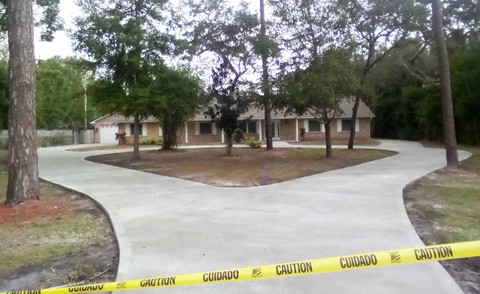
Though it’s established that you don’t have to fix all code violations before selling your house, you should be aware that a known violation can have a drastic consequence on your homeowners insurance. Let’s say that you as a homeowner knew that the plumbing in your house was leaky and one day you came home to find a lake in your basement. Your insurance will not cover that because you knew about the leaky plumbing before a pipe burst.
That is one reason why even minor code violations should be fixed either by the original owner or the real estate investor who is planning to buy the house. Another reason is that even a well-maintained house with a few violations can be unmarketable.
So at the negotiating table when you and an investor are agreeing upon a price for your house, you should expect deductions to cover the associated code violation expenses. The alternative is fixing these problems yourself which could take months because of the permit process and the work schedule of your handyman. If you are in a rush to get your house sold, selling it as-is to a real estate investor is by far the best choice.
Accruing Fees
You as a homeowner probably already know of the monthly fees that are associated with known code violations. Maybe an officer of the Code Enforcement Division of Orlando has cited you with one or more violations. This situation is worse than owing money on your credit card because you could end up with a bill of tens of thousands of dollars that would be a lien on your home.
Realistically for every known violation, the mounting fees plus repairs work against you when you try to sell your home. This creates a reasonable urgency to sell so that you can come out of the situation in good shape. Traditional realtors take many months to sell your home in today’s Orlando housing market so they are not the best choice. Plus you would get stuck with having to fix the code violations yourself because realtors don’t get involved with that part of the business.
The violations below were cited against an Orlando homeowner recently by the code enforcement division. He was given a deadline to fix the problems but ultimately, nothing was done. I’ll explore each violation so you can understand what code enforcement agents are looking for when assessing violations.
Trash / debris – Trash was accumulating in the front of the house but mostly in the back. There was so much that it was blowing into the neighboring yards.
Overgrowth – This family hadn’t cut their grass in months. In fact, the grass was so long that it couldn’t be cut with a lawn mower anymore.
Nuisance conditions – Rodents had a haven in the yard and under the house. The worst part was the fleas and bacteria that come with the rodents which the neighbors were concerned about.
Structural damage – Hurricane Irma caused a tree to fall on the roof which caused some major damage. Although the tree was removed, the roof became an eyesore and was leaky.
Water leaking from pipe – The water that was dripping contributed to rotting of the walls next to the main bathroom. It’s rare that leaky pipes don’t affect something else in a negative way.
Weak floor – The kitchen was dangerous to walk through. What made the situation even more perilous was the heavy appliances that seemed to lilt to the side.
Windows not fitting frames – Obviously this was a money saving move that backfired. Not only were the windows too small, there should have been egress windows in the basement because there was someone sleeping there.
Missing smoke detector – The occupants of this house are smokers so that should explain why they had this code violation. It’s rare for smokers to smoke outside because the whole purpose of smoking is to get into your comfort zone.
Missing window locks – This neighborhood was lower middle class and so not having locks could be the worst of them all. One day the family is able to scrape by, the next day they are suffering from the effects of a violent intruder.
If you choose to work with a real estate investor, you will see that he will be very conscious of the code violations issue. That’s why in the contract you will find a stipulation that his offer is good as long as the title search and code property inspection turn up nothing. Code violations, liens and open permits can sour a deal quickly. But after assessing the true nature of your property a more fair agreement can be reached.
Modifications with No Permits
You may be in a situation where you have done a lot of DIY work without having gotten the appropriate permits. Your thinking was that the work was done on your house so its no one else’s business but yours. Now that it’s time to sell your house the permitting problem is keeping you awake at night.
During the day when you are trying to get offers for your house you demand that you’ll get what your neighbors’ houses are selling for… let’s say $230,000. However, in the back of your mind you know what violations the inspection could turn up, which could bring down your selling price to around $150,000.
If you have already had an inspection detailing various code violations you may be tempted to keep it a secret. But by law you are required to disclose that report to any possible buyer. If you are the typical DIY handyman who has worked on his home for years, the possible projects you may have taken on could have a negative impact on your final sale.
Below are some examples of typical code violations that homeowners in Orlando are faced with. If you are considering selling your property it is in your best interest to glance at this list which will help you understand the real market value of your home.
Circuit Breakers

Maybe 10 years ago you installed a standard circuit breaker (A) because it met some basic specifications and was cheap. Now as you sell your house you find that you need to switch that out in favor of and arc-fault circuit interrupter (B) or a ground-fault / arc-fault combination unit (C). The latter choice is best because it provides the most protection against electrocution and is a great deterrent against frayed wires setting fires. No doubt this is the option that the real estate investor will opt for.
Receptors
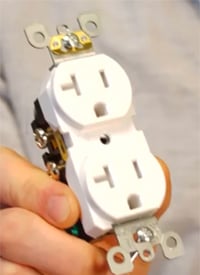
Whether or not you replaced your old receptors, they will have to be replaced with ones that have tamper resistant receptacles. Not only is this replacement good for meeting code and providing a higher level of safety, it is good for aesthetics. White receptacles help a house sell more than yellow ones so your real estate investor will be very eager to have this work done. Also, if you added new receptors, hopefully you spliced into a 20 amp circuit instead of the 15 amp circuit which is meant for lighting. Each of your splices must be contained inside of a junction box as a fire preventative. Making problems like these meet stringent code standards in Orlando could be laborious and costly.
Egress Windows

You might have an old house that didn’t have egress window requirements for sleeping areas when it was built. Or you may have a house that was built in the last 20 years that wasn’t designed for people sleeping in the basement. Whatever the case may be, according to page 8 of the 2020 Florida Building Code report (7th ed.), if your basement is finished and habitable it must have egress windows. Formerly, the requirement was just for rooms where someone slept but that has changed. Also, according to Florida specifications the opening of each window must be 20 inches wide and 24 inches high, providing lifesaving potential in case of a fire.
Asbestos
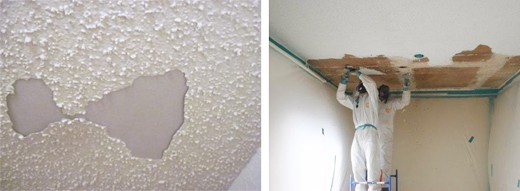
Despite what you have probably heard, asbestos has not been banned in the US. It’s only been regulated by the Environmental Protection Agency and with the mineral’s widespread acceptance for over 50 years in the building industry, we still come into innocuous contact with it in our daily lives. The real problem with asbestos is when remodeling, tiny fibers can be released into the atmosphere and into your lungs. Long term exposure to these particles can cause lung related illnesses like asbestosis or mesothelioma.
If you have an asbestos ceiling that’s falling apart like the one above, either you or your real estate investor has the responsibility of replacing it according to Florida NESHAP guidelines. Even with an asbestos ceiling that’s solid and functional, it’s unlikely that you will be able to sell your house at a profit because of the stigma that accompanies it. You need to do your research and then talk with a local Orlando real estate investor who is able to coordinate renovation and cleanup efforts.
Smoke Alarms
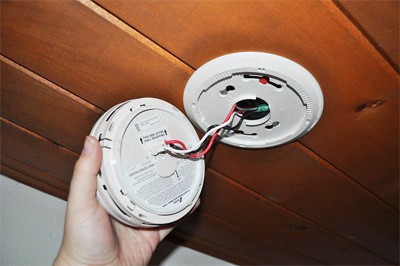
Since 2004 the state of Florida has maintained a strong focus on smoke alarms. According to the Florida Statutes building code (section 553.883) each smoke alarm in a single or multi-family residence must have a battery that will last for at least 10 years. The exception to this rule is for smart detectors whose power source comes from the house’s electrical grid. The National Fire Protection Agency recommends that you should install smoke detectors in each sleeping room on each level of the house. The installation of smoke detectors may seem like optional expense but it is not because you can reduce the fatality rate of a large scale fire by half just by having them in your home.
Ventilation
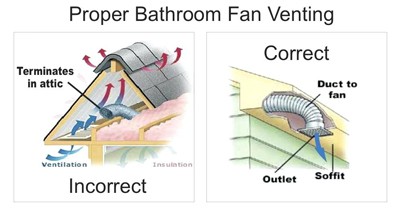
According to the Florida Building Code, bathrooms can have natural ventilation by means of a window or mechanical ventilation using a duct. Especially in Orlando, many older houses are non-compliant by having neither. Some of these houses do have mechanical ventilation but the air duct leads to the attic which causes mold in the long term. If you decide to discontinue use of this kind of ventilation duct, the window aperture must be at least 4% of the area of your bathroom floor.
Unpermitted Additions
The Federal Housing Administration (FHA) allows for loans on houses that have an unpermitted addition. However, it requires that there be nearby comparable sales with similar homes that have the same unpermitted addition. These comparables probably won’t exist in your neighborhood.
Of course there are other kinds of loans that a buyer can take advantage of but it’s in your best interest to get the permitting issue settled before selling your house. Else, your real estate investor must assess the negative impact and deduct from the cash offer he would present to you.
Keep in mind that maybe you have a house with additions that were initially approved but did not get a final inspection to close the permit. That’s why a “open permit” code violation can exist without you even knowing it until a title search is done. Negligent contractors are always to blame here. In most cases these open permits can be settled by your real estate investor by going through the appropriate channels.
Conclusion
By reading this post you can understand that there’s a good chance that your Orlando property has code violations. However, in most cases this won’t stop you from selling your house, it will only diminish your selling price when it’s time to sell.
Perhaps one way to categorize code violations is those that are known by the city code enforcement office and those that aren’t. For the known violations the city can assess fees which will quickly drain your house of equity if you choose to ignore them.
If you can’t fix the problems because of financial constraints you should consider selling to a real estate investor soon. By choosing to ignore the monthly fees month by month you are putting your house in a situation that even a real estate investor won’t touch. The ultimate end will be foreclosure and a dark shadow hanging over your credit for 10 years.